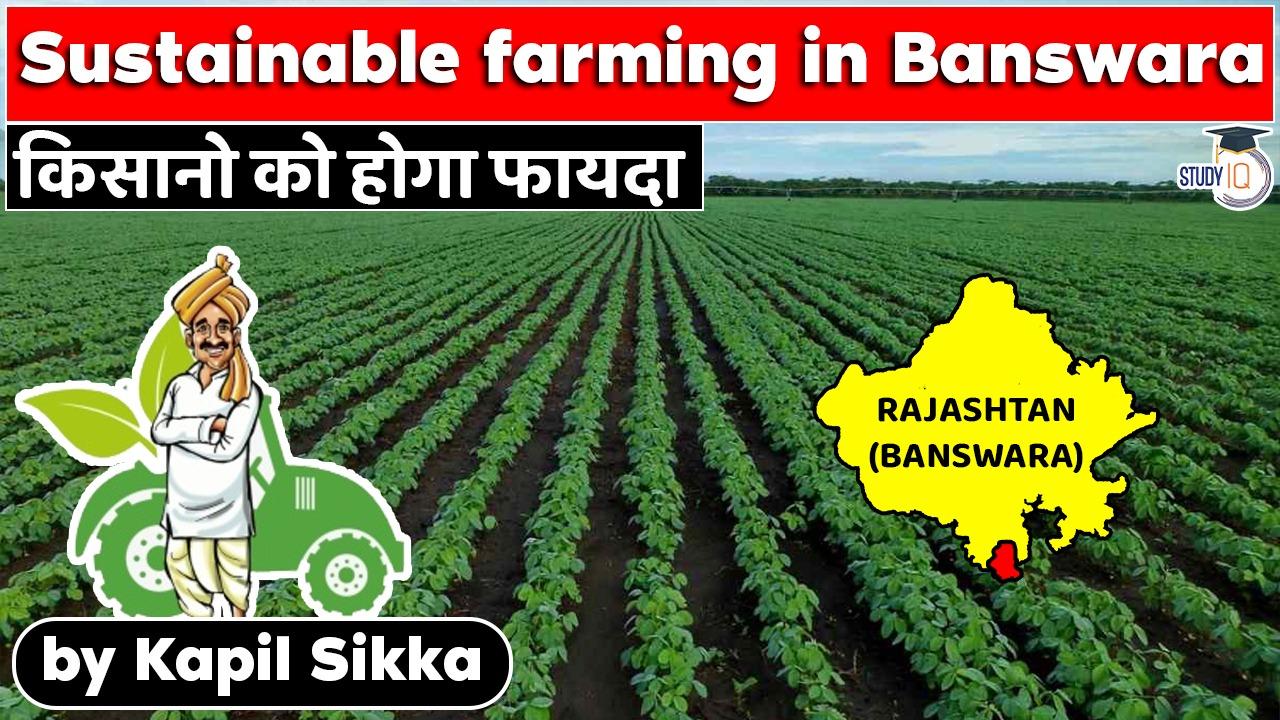Table of Contents

Sustainable Farming Banswara Model
- A sustainable natural farming system adopted in southern Rajasthan’s Banswara district, which has created new livelihood sources and brought food security to indigenous tribal communities, has impressed the Chief Minister’s Economic Transformation Advisory Council.
- The model is being considered for replication elsewhere in the State.
About Banswara Model:
- The techniques and innovations in Banswara district’s Amlipara villagehave enabled the farmers to meet their daily food necessities by growing fruits and vegetables at a low cost.
- The integrated system has also reduced the tribals’ dependence on market and improved nutritional status of the local population.
About Banswara Model:
- Farmers developed the community-managed seed system, which has facilitated diversification of crops.
- The model entails adoption of organic farming, manure, medicines and pesticides and establishment of vermicompost units at agricultural fields.
- The locally prepared organic manure is used for growing maize, wheat, urad and other crops.
- Banswara-based Vaagdhara group has identified the key areas of intervention which would help ensure availability of food throughout the year.
Sustainable Farming:
- It is a broad, umbrella term for growing food using methods that will also nurture society, the environment, and the economy.
- It is an alternative to mainstream, industrial agriculture practices.
- Sustainable farmers seek to support community health and well-being and to work with nature, while still being profitable businesses—though farms can also be run as non-profits or recreational projects.
Why Is Sustainable Farming Important?
- Sustainable farming is important because it offers a solution to the problems caused by the way most of our food is grown today.
- Today’s industrial farming methods, many stemming from the Green Revolution of the 1950s and 1960s, are depleting our natural resources through monocultures and the overuse of pesticides and fertilizers, among other practices, while leaving people with unequal access to food and nutrition around the world.
What Are Sustainable Farming Practices and Methods?
The term “sustainable farming” describes a general approach, and there is not an exact recipe for how to operate a sustainable farm.
Growers apply methods that make sense to them and that reflect their values.
popular terms you may hear as you learn more about sustainable agriculture.
- Agroforestry Practices: Forests have multiple layers, have a diversity of species, and store carbon. Agroforestry is when farmers plant crops using patterns observed in natural forests.
- Integrated Pest Management (IPM): Farmers can use biological and mechanical ways of keeping away unwanted animals and insects from their crops. Chives, sage, and mint plants are examples of natural insecticides.
- Aquaponics and Hydroponics:
- Aquaponics is when people grow fish and vegetables in a mutually beneficial system of sharing water and nutrients.
- Hydroponic – Farmers grow plants without using soil and instead use materials like clay balls, coconut hair and fabric.
- Integrating Livestock and Crops: Farmers can plant cover crops to help them to manage manure and to feed domesticated animals like cows, goats, and sheep.
- Permaculture is a set of ecological design principles and methods that scientists took from Indigenous communities and codified. It is now a worldwide movement. One of the 12 principles of permaculture is to observe and interact.























 WhatsApp
WhatsApp